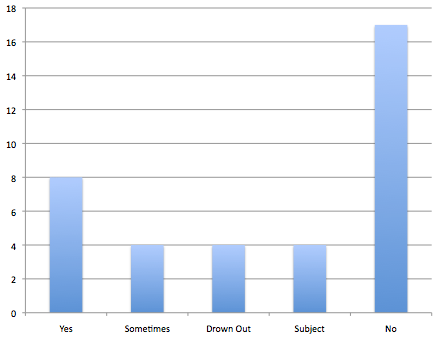I had my educational psychology class complete a short in-class writing assignment related to the topic of working memory and multi-tasking. I originally had no specific motive beyond getting them to apply some of these ideas to their own experiences and so I asked them to write about listening to music while they studied. There were some specific prompts, but this was the general topic. I have read so many who claim younger folks are multi-taskers and prefer this or that environment for learning that I guess I was somewhat surprised with how the students responded.
After reading the responses, I created a simple way to organize what I thought each student had said and I came up with this distribution. If one combines the students who say they listen to no music with those who say they use music to mask out other sounds, it would be pretty difficult to argue these students must multi-task.
I did encounter some interesting comments regarding musical tastes (what works while studying) and when music is helpful and when not. Avoid popular music with lyrics (one student claimed to listen to game tracks). Music while writing and working problem sets (math, chemistry) seems workable, but do not try to listen to music while reading.
Of course, there were some who say they listen to music constantly, but the point is these individuals were not typical. Sometimes I wonder about the methodology used by those who attempt to make the case that learners are changing and educators need to take notice and make adjustments. What I did was quite informal as far as research goes and not really designed to test formal hypotheses, but the typical student in this group is not a multi-tasker.
13 total views



You must be logged in to post a comment.